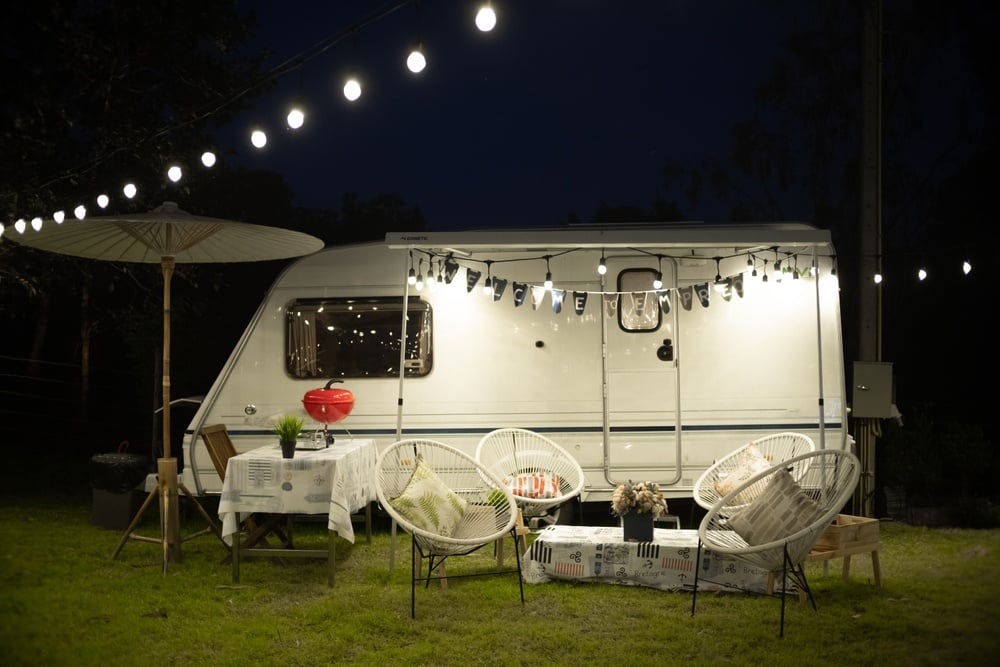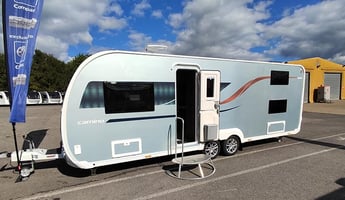Our top tips for budget-friendly caravanning
Sitting outside in the dark, and looking at some twinkling fairy lights you’ve artfully strung across your caravan can certainly make your camping area feel cosy, but are they actually a bit tacky? We’ve seen a couple of social media posts on this subject recently, so thought we’d have our say on the matter!
For some, the twinkling lights are a charming addition to their vehicle; a way to make a temporary home on wheels feel a bit more magical. The same can also be said for flags and bunting, especially if there’s a celebration at hand such as a birthday. For others however, who find themselves in the vicinity of other people’s decorations, it has sometimes been seen as intrusive or even a nuisance, disrupting the natural beauty of the surrounding environment for them.
So, can there be a balance between decorating to your own personal style, and also respecting other people - and the great outdoors - or is it actually just a tacky thing to do? Lets explore below…
The appeal of fairy lights…
Fairy lights do have a certain charm - they bring warmth to the long evenings spent outdoors and add a personal touch to your caravan setup. For families or groups of friends, they help create a cheerful, welcoming atmosphere - which perhaps even helps when it comes to interacting with your new ‘neighbours’ on site. In essence, your caravan is your home on the road, and it makes sense that people would want to decorate it and make it feel homely.
When done tastefully - think soft, warm lights rather than bright or flashing displays (not like the house in National Lampoon’s Christmas Vacation, then) - perhaps your fairy lights can blend into the environment without being too obtrusive. But there’s a fine line between cosy and gaudy, and it’s worth considering where that line falls, especially in shared spaces.

And what about flags and bunting?
In addition to fairy lights, it’s not uncommon to see decorations such as flags and bunting adorning the outside of caravans, especially at events such as festivals. These are obviously very visible during the day, and much larger and more colourful. They also have a habit of coming loose and flying off. Which leads us nicely to our next point…

Having consideration for your fellow campers
One of the key issues with adding fairy lights to your caravan is how it might affect others nearby. Not everyone is there for the same reasons, and many campers relish the peace and quiet of being in nature and essentially getting away from it all. Bright lights, particularly flashing or multicoloured ones, can spoil the atmosphere for those who prefer to enjoy just the stars in the night sky, or the soft glow of a campfire.
For some, fairy lights might be a distraction, even bordering on intrusive, if they’re too bright or garish. In quiet campsites, where people are looking to unwind, overly bright decorations can detract from the natural ambiance, turning a serene spot into something more akin to a carnival. It might also disrupt their sleep if they can see your lights from their sleeping area.
In terms of other decorations such as flags and bunting, these might cause some noise, if flapping about in the wind. They could also get caught on other vehicles if they come loose, and it's not unheard of for bunting to be pinned out in the way that guy ropes are, which can cause people walking past to trip over it.
If you’re going to decorate the outside of your caravan, it’s definitely worth putting some thought into how you will attach the items. Will you peg them on, tie them tightly with knots or perhaps use those little hooks with suckers on? Whatever you opt for, do make sure you can get in and out of the door with ease, and that the decorations don’t make moving the awning in and out a difficult prospect. Although, that might make any fellow disgruntled campers mutter a little ‘Ha!’ if they see that happen (especially if they’ve just tripped over said bunting)…
Light pollution and the night sky
Fairy lights might seem harmless, but they do contribute to light pollution in the outdoors. When we’re in nature, one of the greatest joys can be the clarity of the night sky - and obviously stargazing is a well-established part of the typical camping experience. However, even small, consistent light sources can diminish the visibility of stars, preventing people from appreciating the night sky in its full glory.
Environmental concerns
Another aspect to consider is the environmental impact of additional lighting. While fairy lights themselves might not use much electricity, the cumulative effect of many campers using unnecessary lights can add up. You could opt for solar-powered lights, if you must have them, as a more eco-friendly alternative.
You should also be careful in terms of what external items you are attaching any lights or decorations to - trees, for example - as your campsite might not allow that!
Also, if decorations such as flags and bunting come loose or are left behind, they can end up affecting the local wildlife if they blow into trees or ponds and rivers. You may have moved on by then, but your Union Jack bunting might still be flapping away in the neighbouring field for the next few months, as a lingering eyesore.
So what’s our verdict? Well, in the end, we think that whether decorations on a caravan are tacky or tasteful depends on how they’re used and where, the size of them, and probably whose point of view you are thinking of - the owner or the surrounding people! On some campsites, especially those aimed at families or more social settings, a few twinkling lights or a bit of birthday bunting won’t be out of place. But in quieter, more secluded spots or environmentally sensitive areas, they could come across as inconsiderate.
In essence, it’s always best to gauge the atmosphere of the site you’re staying at, and ask yourself if your decorations might be disruptive, and whether they are best kept inside rather than outside.
Ultimately, while it’s tempting to deck out your caravan like a big top tent, sometimes less really is more - especially when the backdrop of nature is likely to be the best thing you could be looking at anyway.









